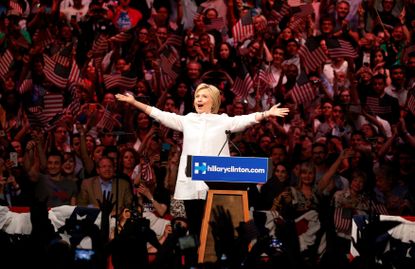Stop telling me to get excited about Hillary Clinton
I'm a progressive millennial feminist — and no, I'm still not ready for Hillary the Hawk


A millennial feminist is supposed to start an essay about Hillary Clinton by talking about mothers.
I am supposed to say that my mom grew up under the oppressive thumb of the American patriarchal system and always dreamed of raising a daughter in a world with a female president. I'm supposed to talk about how on June 6, Clinton brought that hope a lot closer to reality within my mother's lifetime and how this is amazing. I'm supposed to say that I am inspired by the fact that my future children might belong to the first generation to never know an America led exclusively by men.
But that is not how I am going to begin this essay.
Subscribe to The Week
Escape your echo chamber. Get the facts behind the news, plus analysis from multiple perspectives.

Sign up for The Week's Free Newsletters
From our morning news briefing to a weekly Good News Newsletter, get the best of The Week delivered directly to your inbox.
From our morning news briefing to a weekly Good News Newsletter, get the best of The Week delivered directly to your inbox.
I'm going to begin with the first time another woman sat me down and gave me "the Talk." I was a senior at a small liberal arts college in Vermont; it was spring 2015. In the cafeteria, one of us brought up politics: "I can't wait to vote for a woman," I said.
"I'm voting for Bernie Sanders, if he runs," my friend replied. At first I was shocked — she was my most politically active friend, a strong Obama supporter who had always spoken up for the rights of women. But then, as we started to talk, I found there wasn't much about Hillary the Politician that I liked — I was struck then that I can't wait to vote for a woman isn't really a good reason to vote for someone, as exciting as the history-making result might be.
But for the next 14 months, women would continue to give me the Talk. Only, this Talk was different. This was the Talk about why I was a "bad feminist," or even a "bad woman," for not supporting Hillary. It was the Talk about why I was "too young" to understand systematic sexism, "too naïve" to hope of having a different woman president in my lifetime, "too ungrateful" for saying not this one.
In fact, only months after I wrapped an arm around Gloria Steinem for a picture following her intimate commencement speech at my graduation, she rejected my own agency as an intelligent, politically-tapped-in individual by claiming young women supported Bernie Sanders because that's "where the boys are."
I'm not pooh-poohing what Clinton has fought for and accomplished, but I am not popping champagne over her coronation, just as I wouldn't be if the first woman to be crowned the presumptive nominee of a major American political party had been Carly Fiorina — a candidate whose policies and positions I fundamentally disagree with. I am well aware of the significance of having the first woman nominee in the 238-year history of my country, and how shameful this is in light of the fact that 63 countries have had a female head of state in the past 50 years or so.
But as women tell me during the Talk, I am young — so young, I confess, that I have only voted for a president once in my life, and that president was a black man. In my second-ever election, five of the Republican candidates would have also made historic presidents — a second black man, Ben Carson; an Indian-American, Bobby Jindal; a woman, Carly Fiorina; or a Latino man, Ted Cruz and Marco Rubio. Being born in the early '90s is a privilege: "A woman will become U.S. president, sooner rather than later, which may be why younger women are less motivated by the 'first woman' narrative," A (problematic) Wall Street Journal opinion piece recently read. "The question they ask, more wisely than the Baby Boomers, is whether this woman should be president."
Indeed, the focus on the fact that Hillary Clinton could be the first female president eclipses even her most damning political scars, as Zoe Heller pointed out in The New York Review of Books:
Clinton's older female supporters, who have set so much store by Clinton running "as a woman," have responded with some exasperation to the failure of the gender strategy. It is not enough that she is going to secure the nomination as the sensible, electable, pragmatic choice. They want her to win as the revolutionary choice. Their default analysis is that young women who don't favor Clinton haven't lived long enough, haven't experienced enough sexism, to do the "radical" thing and vote along gender lines. "Here's what I see," Debbie Wasserman Schultz, chairwoman of the Democratic National Council, told The New York Times in January: "a complacency among a generation of young women whose entire lives have been lived after Roe v. Wade was decided." [New York Review of Books]
But as the editors of False Choices: The Faux Feminism of Hillary Rodham Clinton note in the introduction to their collection of feminist essays dissenting against Clinton, the presumptive Democratic nominee has a number of "firsts" under her belt that liberals probably ought not to celebrate. For example, when she became the first woman on the board at Walmart — "a company that has systematically discriminated against its low-wage female employees for decades." There is "no evidence that Clinton ever attempted to seriously address the problems faced by low-wage female workers during her time with the company, and she has always declined to give interviews on this subject," editors Liza Featherstone and Amber A'Lee Frost write.
In my own opinion, Clinton has shown an alarming lack of foresight and judgment: I condemn her support of the racist 1994 crime bill, her vote in favor of the Iraq war, her approval of Israel's war in Gaza, her leniency with fracking, her slow come-around to supporting same-sex marriage, her uncomfortable encounters with Black Lives Matter protesters, her rhetoric during President Obama's 2008 campaign, and her argument for intervention in Libya and the ousting of Gadhafi, which Obama has called the single worst mistake of his presidency.
But the writers in False Choices also pay particular attention to the ways in which Hillary the Hawk has actually undermined feminism. She rewarded states that violently criminalized prostitution when she was secretary of state, despite condemnation by major human rights organizations. With a U.S.-backed coup, she helped destabilize the homicide capital of the world, Honduras, resulting in "skyrocketing" femicides. She and her husband both promoted sweatshop conditions in developing nations in the guise of American interest in the '90s, a strategy that continued into Clinton's stint as secretary of state. And of course there is the fact that war, a go-to move for Clinton, always results in increases in rapes, as False Choices points out.
I'm not holding out for an 11th hour miracle that makes Bernie Sanders the nominee (in fact, I agree with many of Clinton's supporters — he probably should have dropped out awhile ago). But just as I didn't have to vote for Clinton because of our mutual sex, I don't have to be happy or grateful or appreciative that this is the woman who changed American history. "'We' will be told that the glass ceiling has been broken. 'We' will hear that we are now in a postfeminist era. But the particular 'we' remains too rich, too white, too imperial, too capitalist, too everything that most of us are not… Anti-imperial feminists need to resolve to say, not in our name," Zillah Eisenstein writes in the concluding essay of False Choices.
Still, I haven't yet decided if I will vote for Hillary Clinton this November — not because I would ever in a million years vote for her alternative, but because my New York state vote will (likely) not much matter when it comes to the final electoral college tally. Instead, I have to weigh two very possible outcomes: Do I want to one day be able to tell a daughter that I voted for the first female president? Or will I come to have blood on my hands if I put that mark on my ballot this fall?
There will still be those who say I am a bad feminist, even when evidence is presented to the contrary. And for them, I will close this essay the way a millennial feminist is supposed to — by quoting Beyoncé: "Sorry, I ain't sorry."
Create an account with the same email registered to your subscription to unlock access.
Sign up for Today's Best Articles in your inbox
A free daily email with the biggest news stories of the day – and the best features from TheWeek.com
Jeva Lange was the executive editor at TheWeek.com. She formerly served as The Week's deputy editor and culture critic. She is also a contributor to Screen Slate, and her writing has appeared in The New York Daily News, The Awl, Vice, and Gothamist, among other publications. Jeva lives in New York City. Follow her on Twitter.
-
 Ottawa climate talks: can global plastic problem be solved?
Ottawa climate talks: can global plastic problem be solved?In the spotlight Nations aim to draft world's first treaty on plastic pollution, but resistance from oil- and gas-producing countries could limit scope
By Harriet Marsden, The Week UK Published
-
 Netherlands split on WFH for sex workers
Netherlands split on WFH for sex workersSpeed Read Councils concerned over 'nuisance' of at-home sex work, but others say changes will curb underground sex trade
By Arion McNicoll, The Week UK Published
-
 'He adored Trump, and then rejected him'
'He adored Trump, and then rejected him'Today's Newspapers A roundup of the headlines from the US front pages
By The Week Staff Published
-
 Arizona court reinstates 1864 abortion ban
Arizona court reinstates 1864 abortion banSpeed Read The law makes all abortions illegal in the state except to save the mother's life
By Rafi Schwartz, The Week US Published
-
 Trump, billions richer, is selling Bibles
Trump, billions richer, is selling BiblesSpeed Read The former president is hawking a $60 "God Bless the USA Bible"
By Peter Weber, The Week US Published
-
 The debate about Biden's age and mental fitness
The debate about Biden's age and mental fitnessIn Depth Some critics argue Biden is too old to run again. Does the argument have merit?
By Grayson Quay Published
-
 How would a second Trump presidency affect Britain?
How would a second Trump presidency affect Britain?Today's Big Question Re-election of Republican frontrunner could threaten UK security, warns former head of secret service
By Harriet Marsden, The Week UK Published
-
 'Rwanda plan is less a deterrent and more a bluff'
'Rwanda plan is less a deterrent and more a bluff'Instant Opinion Opinion, comment and editorials of the day
By The Week UK Published
-
 Henry Kissinger dies aged 100: a complicated legacy?
Henry Kissinger dies aged 100: a complicated legacy?Talking Point Top US diplomat and Nobel Peace Prize winner remembered as both foreign policy genius and war criminal
By Harriet Marsden, The Week UK Last updated
-
 Trump’s rhetoric: a shift to 'straight-up Nazi talk'
Trump’s rhetoric: a shift to 'straight-up Nazi talk'Why everyone's talking about Would-be president's sinister language is backed by an incendiary policy agenda, say commentators
By The Week UK Published
-
 More covfefe: is the world ready for a second Donald Trump presidency?
More covfefe: is the world ready for a second Donald Trump presidency?Today's Big Question Republican's re-election would be a 'nightmare' scenario for Europe, Ukraine and the West
By Sorcha Bradley, The Week UK Published